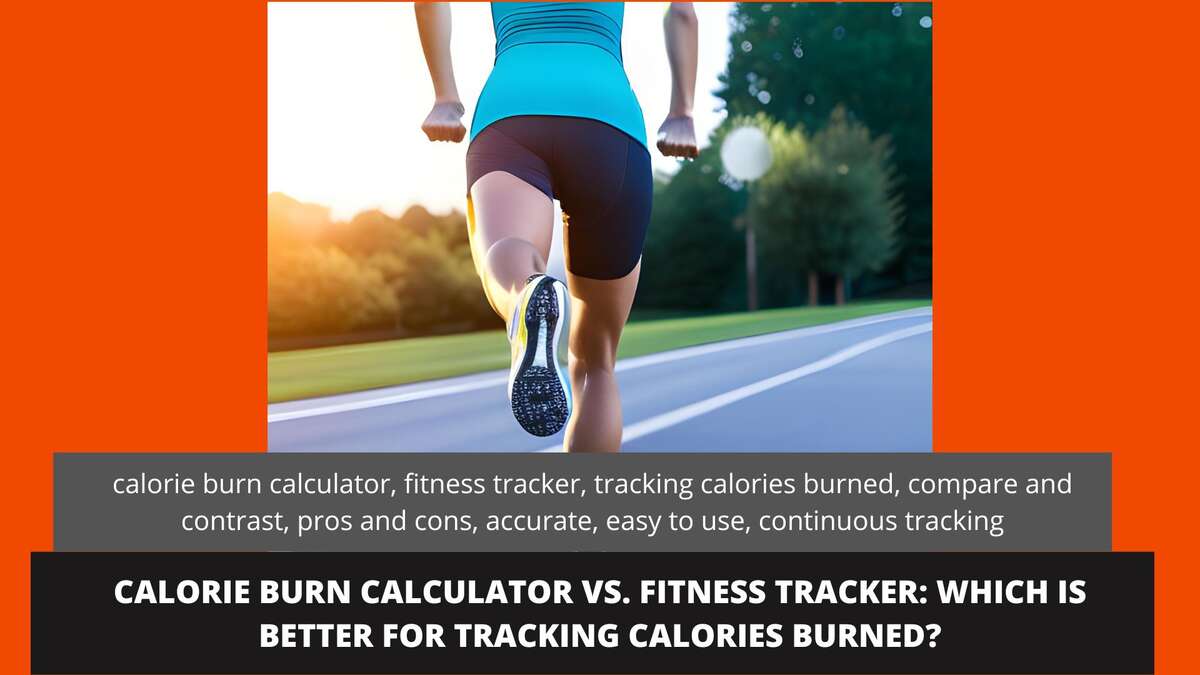Tracking calories burned during a workout can be an effective way to monitor your progress and ensure that you're achieving your fitness goals. However, with so many different tools available, it can be difficult to determine which one is the best for tracking calories burned. Two of the most popular options are calorie burn calculators and fitness trackers. In this article, we'll compare and contrast the pros and cons of each tool to help you determine which one is better for tracking calories burned.
What is a Calorie Burn Calculator?
A calorie burn calculator is a tool that helps you estimate the number of calories you burn during different types of workouts. These calculators take into account your weight, height, age, gender, and the type of exercise you're doing to provide an estimate of the number of calories you're burning. Calorie burn calculators are typically available online or as mobile apps, and they're free to use.
What is a Fitness Tracker?
A fitness tracker is a wearable device that tracks your physical activity throughout the day, including the number of steps you take, the distance you travel, and the number of calories you burn. Fitness trackers are typically worn on the wrist and use sensors to track your movements. They can also be synced with your smartphone or computer to provide additional information and insights about your activity levels.
Pros and Cons of Using a Calorie Burn Calculator
Pros:
- Accurate: Calorie burn calculators use data such as your weight, height, age, and gender to provide a more accurate estimate of the number of calories you're burning during your workout.
- Easy to Use: Calorie burn calculators are typically very easy to use. You simply input your information and the type of workout you're doing, and the calculator provides an estimate of the number of calories you're burning.
- Free: Most calorie burn calculators are available online or as mobile apps, and they're free to use.
Cons:
- Not Continuous: Calorie burn calculators only provide an estimate of the number of calories you're burning during your workout. They don't provide any information about the number of calories you're burning throughout the day or during other types of physical activity.
- Not as Comprehensive: Calorie burn calculators don't provide as much information about your physical activity as fitness trackers. They don't track your steps, distance traveled, or other metrics that can be helpful in monitoring your overall activity levels.
Pros and Cons of Using a Fitness Tracker
Pros:
- Continuous Tracking: Fitness trackers provide continuous tracking of your physical activity throughout the day, giving you a more comprehensive picture of your activity levels.
- Multifunctional: Fitness trackers can track a variety of metrics, including steps taken, distance traveled, and calories burned, making them a more multifunctional tool for monitoring your physical activity.
- Motivational: Fitness trackers can be motivational, providing you with feedback on your progress and encouraging you to reach your fitness goals.
Cons:
- Not as Accurate: While fitness trackers provide continuous tracking, their estimates of calories burned can be less accurate than those provided by calorie burn calculators. This is because fitness trackers use algorithms to estimate the number of calories burned based on your movements, which may not be as precise as the calculations used by calorie burn calculators.
- Not Always Comfortable: Some people find fitness trackers uncomfortable to wear, particularly during exercise. This can be a barrier to using the device consistently.
- Cost: Fitness trackers can be more expensive than calorie burn calculators, particularly if you're looking for a high-end device with advanced features.
Which is Better for Tracking Calories Burned?
So, which is better for tracking calories burned: a calorie burn calculator or a fitness tracker? The answer depends on your goals and preferences.
If you're primarily interested in tracking the number of calories you're burning during specific workouts, a calorie burn calculator may be the better option. These calculators are accurate and easy to use, and they provide a good estimate of the number of calories you're burning during different types of exercise.
However, if you're interested in tracking your overall activity levels throughout the day, a fitness tracker may be the better choice. Fitness trackers provide continuous tracking of your physical activity, including the number of steps you take and the distance you travel, in addition to the number of calories you're burning. They can also be motivational, providing you with feedback on your progress and encouraging you to be more active.
Ultimately, the best tool for tracking calories burned is the one that you will use consistently. If you find a calorie burn calculator or fitness tracker that works well for you and fits with your lifestyle and preferences, it can be an effective tool for achieving your fitness goals.
Conclusion
Tracking calories burned is an important part of monitoring your physical activity and achieving your fitness goals. While both calorie burn calculators and fitness trackers can be effective tools for tracking calories burned, they each have their pros and cons. By understanding the differences between these tools, you can make an informed decision about which one is best for you and your fitness journey.
If you're interested in using a calorie burn calculator, be sure to check out AskMyCalculator's Calorie Burn Calculator, which provides an accurate estimate of the number of calories you're burning during different types of exercise. And if you're interested in tracking your overall calorie intake and needs, check out our Calorie Intake Calculator and Calorie Needs Calculator.
